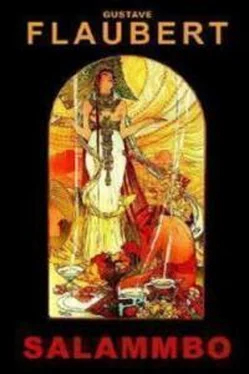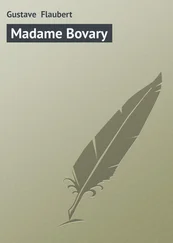Matho felt suffocated in the warm atmosphere pressed down upon him by the cedar partitions. All these symbols of fecundation, these perfumes, radiations, and breathings overwhelmed him. Through all the mystic dazzling he kept thinking of Salammbo. She became confused with the goddess herself, and his loved unfolded itself all the more, like the great lotus–plants blooming upon the depths of the waters.
Spendius was calculating how much money he would have made in former days by the sale of these women; and with a rapid glance he estimated the weight of the golden necklaces as he passed by.
The temple was impenetrable on this side as on the other, and they returned behind the first chamber. While Spendius was searching and ferreting, Matho was prostrate before the door supplicating Tanith. He besought her not to permit the sacrilege, and strove to soften her with caressing words, such as are used to an angry person.
Spendius noticed a narrow aperture above the door.
"Rise!" he said to Matho, and he made him stand erect with his back against the wall. Placing one foot in his hands, and then the other upon his head, he reached up to the air–hole, made his way into it and disappeared. Then Matho felt a knotted cord—that one which Spendius had rolled around his body before entering the cisterns—fall upon his shoulders, and bearing upon it with both hands he soon found himself by the side of the other in a large hall filled with shadow.
Such an attempt was something extraordinary. The inadequacy of the means for preventing it was a sufficient proof that it was considered impossible. The sanctuaries were protected by terror more than by their walls. Matho expected to die at every step.
However a light was flickering far back in the darkness, and they went up to it. It was a lamp burning in a shell on the pedestal of a statue which wore the cap of the Kabiri. Its long blue robe was strewn with diamond discs, and its heels were fastened to the ground by chains which sank beneath the pavement. Matho suppressed a cry. "Ah! there she is! there she is!" he stammered out. Spendius took up the lamp in order to light himself.
"What an impious man you are!" murmured Matho, following him nevertheless.
The apartment which they entered had nothing in it but a black painting representing another woman. Her legs reached to the top of the wall, and her body filled the entire ceiling; a huge egg hung by a thread from her navel, and she fell head downwards upon the other wall, reaching as far as the level of the pavement, which was touched by her pointed fingers.
They drew a hanging aside, in order to go on further; but the wind blew and the light went out.
Then they wandered about, lost in the complications of the architecture. Suddenly they felt something strangely soft beneath their feet. Sparks crackled and leaped; they were walking in fire. Spendius touched the ground and perceived that it was carefully carpeted with lynx skins; then it seemed to them that a big cord, wet, cold, and viscous, was gliding between their legs. Through some fissures cut in the wall there fell thin white rays, and they advanced by this uncertain light. At last they distinguished a large black serpent. It darted quickly away and disappeared.
"Let us fly!" exclaimed Matho. "It is she! I feel her; she is coming."
"No, no," replied Spendius, "the temple is empty."
Then a dazzling light made them lower their eyes. Next they perceived all around them an infinite number of beasts, lean, panting, with bristling claws, and mingled together one above another in a mysterious and terrifying confusion. There were serpents with feet, and bulls with wings, fishes with human heads were devouring fruit, flowers were blooming in the jaws of crocodiles, and elephants with uplifted trunks were sailing proudly through the azure like eagles. Their incomplete or multiplied limbs were distended with terrible exertion. As they thrust out their tongues they looked as though they would fain give forth their souls; and every shape was to be found among them as if the germ–receptacle had been suddenly hatched and had burst, emptying itself upon the walls of the hall.
Round the latter were twelve globes of blue crystal, supported by monsters resembling tigers. Their eyeballs were starting out of their heads like those of snails, with their dumpy loins bent they were turning round towards the background where the supreme Rabbet, the Omnifecund, the last invented, shone splendid in a chariot of ivory.
She was covered with scales, feathers, flowers, and birds as high as the waist. For earrings she had silver cymbals, which flapped against her cheeks. Her large fixed eyes gazed upon you, and a luminous stone, set in an obscene symbol on her brow, lighted the whole hall by its reflection in red copper mirrors above the door.
Matho stood a step forward; but a flag stone yielded beneath his heels and immediately the spheres began to revolve and the monsters to roar; music rose melodious and pealing, like the harmony of the planets; the tumultuous soul of Tanith was poured streaming forth. She was about to arise, as lofty as the hall and with open arms. Suddenly the monsters closed their jaws and the crystal globes revolved no more.
Then a mournful modulation lingered for a time through the air and at last died away.
"And the veil?" said Spendius.
Nowhere could it be seen. Where was it to be found? How could it be discovered? What if the priests had hidden it? Matho experienced anguish of heart and felt as though he had been deceived in his belief.
"This way!" whispered Spendius. An inspiration guided him. He drew Matho behind Tanith's chariot, where a cleft a cubit wide ran down the wall from top to bottom.
Then they penetrated into a small and completely circular room, so lofty that it was like the interior of a pillar. In the centre there was a big black stone, of semispherical shape like a tabourine; flames were burning upon it; an ebony cone, bearing a head and two arms, rose behind.
But beyond it seemed as though there were a cloud wherein were twinkling stars; faces appeared in the depths of its folds—Eschmoun with the Kabiri, some of the monsters that had already been seen, the sacred beasts of the Babylonians, and others with which they were not acquainted. It passed beneath the idol's face like a mantle, and spread fully out was drawn up on the wall to which it was fastened by the corners, appearing at once bluish as the night, yellow as the dawn, purple as the sun, multitudinous, diaphanous, sparkling light. It was the mantle of the goddess, the holy zaimph which might not be seen.
Both turned pale.
"Take it!" said Matho at last.
Spendius did not hesitate, and leaning upon the idol he unfastened the veil, which sank to the ground. Matho laid his hand upon it; then he put his head through the opening, then he wrapped it about his body, and he spread out his arms the better to view it.
"Let us go!" said Spendius.
Matho stood panting with his eyes fixed upon the pavement. Suddenly he exclaimed:
"But what if I went to her? I fear her beauty no longer! What could she do to me? I am now more than a man. I could pass through flames or walk upon the sea! I am transported! Salammbo! Salammbo! I am your master!"
His voice was like thunder. He seemed to Spendius to have grown taller and transformed.
A sound of footsteps drew near, a door opened, and a man appeared, a priest with lofty cap and staring eyes. Before he could make a gesture Spendius had rushed upon him, and clasping him in his arms had buried both his daggers in his sides. His head rang upon the pavement.
Then they stood for a while, as motionless as the corpse, listening. Nothing could be heard but the murmuring of the wind through the half–opened door.
The latter led into a narrow passage. Spendius advanced along it, Matho followed him, and they found themselves almost immediately in the third enclosure, between the lateral porticoes, in which were the dwellings of the priests.
Читать дальше









![Гюстав Флобер - Закат Карфагена [Сборник]](/books/414440/gyustav-flober-zakat-karfagena-sbornik-thumb.webp)
